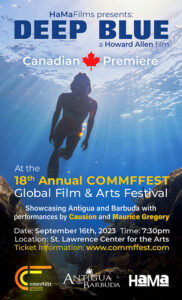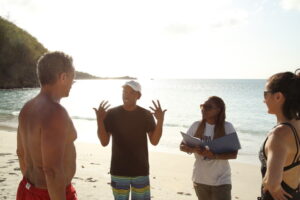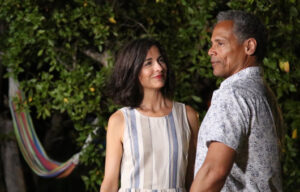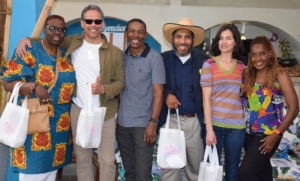By Canute Lawrence

On Saturday, September 16, Antigua and Barbuda will showcase the Canadian premiere of its HaMafilm’s ‘‘Deep Blue’’ at the 18th Annual COMMFFEST Global Community Film & Arts Festival at the St. Lawrence Centre for the Arts, 27 Front Street East at 7:30 PM.
‘’Deep Blue,’’ dubbed an environmental love story is HaMafilms’ fifth production by Antiguan-Canadian husband and wife team – Howard and Mitzi Allen. The film unravels the heart-wrenching tale of an over-zealous resort developer locked in a heated battle with a Canadian marine biologist and a small fishing village regarding the building of a super-deluxe resort in a delicately critical ecological area of the picturesque island of Antigua. As climate change intensifies its assault on paradise island, the parties try to justify their respective position while environmental catastrophe looms in the balance and threatens to permanently destroy not just an ecosystem, but the coastline as well as the cultural way of life and livelihoods of a close-knit fishing community.
“Deep Blue” was first screened in Antigua and Barbuda on March 25, this year. Subsequently, it had its second screening in New York City on June 16, at the Antigua and Barbuda House (established in 1934), to Antiguan citizens. The responses to the film at both screenings were phenomenal. They totally love the message the film highlights as audience members, after both screenings, were engaged in passionately fulsome discussions on the issues of indigenous land rights, the ecological benefits of the mangroves, and the catastrophic outcomes that would plague paradise should construction of the hotels begin. The mangroves which provide an entire ecosystem of plant and animal life, slow down water flow and encourage sediment deposits that reduce coastal erosion. As several cities and nations currently experience the effects of climate change evidenced in fatal floodings and unrelenting forest fires, “Deep Blue” raises a critical question; is it wise to sacrifice nature’s way of self-preservation to man-made structures purely for financial profits? This sentiment is echoed by one of the major characters in the film, the community matriarch played by the renowned Trinidadian actress, Rhoma Spencer, who, in a scene, asks defiantly, “When did paradise become merchandize?”
“Deep Blue” star Canadian actors Peter Williams and Kim Huffman accompanied by a roster of international talents of the calibre of Canadian-Guyanese Actor Ryan Singh, British Actor Tom Durant

Pritchard (of “The Crown” on Netflix, and biopic “Judy”), Antiguan-British Actress Julie Hewlett (“The Sweetest Mango”), and Trinidadian-Canadian Actress Rhoma Spencer. Singh is excited about this film because it was his first time going to the Caribbean to work in a feature film. Singh shared that it was an amazing experience “participating in telling stories that matter; stories that come from the Caribbean,” and that, “for a long time Caribbean stories [have] not been a feature in Western cinemas.”
Rhoma Spencer plays the Matriarch of the Rasta Compound, which made her reflect on how much the Rastas and their philosophy have long been the keepers and custodians of the environment before it became fashionable. Spencer also recalls how the people of Tobago mobilized themselves to stop Sandals Resorts from building a hotel that would have the mangroves destroyed, negatively impacting the ecosystem of the area on which the hotel was going to be built. “This movie was art reflecting a life moment that I only read about in the news, and here I was literally taking on the hotel developers like my people in Tobago” Spencer remarked.
The soundtrack features original music by Causion, Antigua and Barbuda’s Reggae Ambassador, Antiguan musician Vincent McCoy along with singer/songwriter Promise No Promises. The film’s theme song, ‘Beautiful’, is written and performed by Grammy Award winner, singer/songwriter Maurice Gregory (formerly of Third World).

Howard Allen, who serves as the film’s writer and director, says he wants members of the African and Caribbean diaspora to elevate themselves because “most of the films coming out of the Caribbean are about guns, gangs and crimes” and emphasizes, “that’s not all that happens in the Caribbean.” Howard believes it is important for Caribbean people to tell stories that affect their daily lives because he learned so much about the benefits of the mangroves and what they represent in the ecosystem.
Mitzi Allen, the film’s executive producer, wants Diasporans to celebrate Caribbean content by supporting each other’s ventures. She noted that if Caribbean people want to see more feature films in cinemas and on established networks like Netflix, we have to support Caribbean film-makers and be intentional about investing in film-making talents and technical equipment. Mitzi went on to share some of the challenges experienced from the beginning of, and during the filming process. “There is a lack of financial and funding structures in the Eastern Caribbean,” she said. Unlike Jamaica that has film-making talents and basic technical equipment in place, there is a paucity of indigenous movie-producing structures and skilled personnel in the Eastern Caribbean islands. “Deep Blue” is completely self-funded by the couple who shared that COVID-19 also delayed the film by 2 years as their funds dried up in the middle of production. Shooting of the film began in 2019, and the team wrapped the film in the summer of 2021, thanks to the dedicated team who rallied so that they could make it to the finish line. Post-production took place during the height of the pandemic.

Mitzi says “Deep Blue” is for anyone who has an appetite for good film. Anyone interested in seeing the film can purchase tickets online from the COMMFFEST website. After the premiere, there will be an opportunity to participate in a Q&A with Howard and Mitzi Allen followed by performances by Causion and Maurice Gregory.


